Baal Blu-ray Movie
HomeBaal Blu-ray Movie 
Criterion | 1970 | 84 min | Not rated | Mar 20, 2018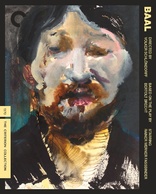
Price
List price:Amazon: $32.28 (Save 19%)
Third party: $32.28 (Save 19%)
Only 15 left in stock (more on the way).
Movie rating
6.3 | / 10 |
Blu-ray rating
| Users | 3.5 | |
| Reviewer | 4.5 | |
| Overall | 3.8 |
Overview
Baal (1970)
Baal, a young, ingenious, and unstable poet-balladeer with a scandalous zest for life, love, and liquor, is followed through multiple sexual encounters and cruel, shocking personal adventures.
Starring: Rainer Werner Fassbinder, Margarethe von Trotta, Rudolf Waldemar Brem, Michael Gempart, Hanna SchygullaDirector: Volker Schlöndorff
| Foreign | Uncertain |
| Drama | Uncertain |
Specifications
Video
Video codec: MPEG-4 AVC
Video resolution: 1080i
Aspect ratio: 1.35:1
Original aspect ratio: 1.37:1
Audio
German: LPCM Mono
Subtitles
English
Discs
Blu-ray Disc
Single disc (1 BD)
Playback
Region A (locked)
Review
Rating summary
| Movie | 4.0 | |
| Video | 4.0 | |
| Audio | 5.0 | |
| Extras | 4.5 | |
| Overall | 4.5 |
Baal Blu-ray Movie Review
Reviewed by Dr. Svet Atanasov May 14, 2018Volker Schlöndorff's "Baal" (1970) arrives on Blu-ray courtesy of Criterion. The supplemental features on the disc include two archival interviews with director Volker Schlöndorff; new video interview with actress and director Margarethe von Trotta; new filmed conversation between actor Ethan Hawke and playwright Jonathan Marc Sherman; and more. The release also arrives with an illustrated leaflet featuring critic Dennis Lim's essay "The Nature of the Beast" and technical credits. In German, with optional English subtitles for the main feature. Region-A "locked".
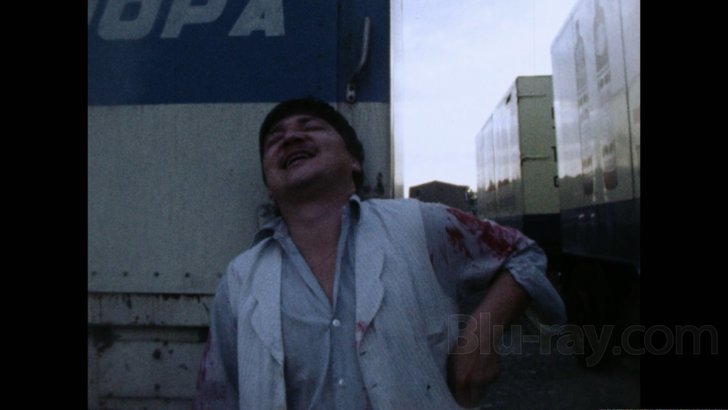
The abuser
Do you remember how a few years ago Lars von Trier suddenly became one of the most hated acclaimed international directors? Let me remind you how and why it happened because it will help you understand exactly what takes place in Volker Schlöndorff’s film Baal.
So over the course of a few months the Danish director unleashed a series of brash statements that hit hard that very influential closed community of powerful producers, ‘socially-aware’ festival directors, and well-connected film critics that determine the following: the type of material that should make a ‘good’ film; whether a film should enter the festival system, which is the biggest market place for projects conceived outside of the Hollywood system; and the type of coverage that a film gets if it makes it to the festival system and beyond. In other words, von Trier targeted the people that control the entire international production chain which chooses what type of films should be made and determines whether they can become successful.
But why exactly did he do it?
The shorter and simpler answer is because eventually someone had to do it. The longer answer is because von Trier had always been something of a rebel that refused to tolerate the phony rules and regulations that determined what is ‘good’ and ‘bad’. The basic idea behind the Dogme 95 movement that von Trier and Thomas Vinterberg established a few decades earlier, for instance, was precisely an attempt to reject the ‘classic’ approach to making ‘good’ films, and prove that a director can produce a quality film while going directly against the safe standards that the people from the above-mentioned community had successfully used to cage the industry. However, after the Dogme 95 movement went mainstream, and ironically thanks to the same community, von Trier lost interest in it and refocused on shooting films in which he highlighted the hypocrisy that all kinds of ‘freethinkers’ supported under a wide range of different pretexts. (Dogville and The Boss of It All, for instance, remain extremely relevant today precisely for this very reason). So by the time Antichrist and Nymphomaniac Volume I and II emerged von Trier’s transformation was already complete and he had become an entirely different kind of unapologetic disruptor that was firing at a much bigger pool of targets. It was quite the circus really because some of the folks on the other side, including some of his old admirers, really lost it. Here’s a great example from Variety’s Todd McCarthy who chose to fight fire with fire: "Lars von Trier cuts a big fat art-film fart with Antichrist. As if deliberately courting critical abuse, the Danish bad boy densely packs this theological-psychological horror opus with grotesque, self-consciously provocative images that might have impressed even Hieronymus Bosch". The proper translation here is that von Trier was bad -- behind his camera and while he was in front of other people’s cameras offering ‘unacceptable’ opinions -- but he was actually an awfully good, perhaps even brilliant player who had crafted a stunning kabuki play and by trying to delegitimize him and his work his detractors were actually doing a phenomenal job of destroying their reputations, just as he had intended.
Volker Schlöndorff’s film is based on a terrific novel by Bertolt Brecht whose main protagonist (a fantastic Reiner Werner Fassbinder) basically does a lot of nasty things to provoke the people around him -- and you the viewer -- to start hating him with a passion. A few actually openly call him a swine as he very quickly emerges as the type of irredeemable outcast who seems to feel alive only when he demeans and inflicts pain on those who are naïve enough to assume that there is some good in him.
This film, however, is also one very carefully scripted kabuki play whose main objective is to become so awful that it actually makes it impossible for you to rationalize it while applying conventional cinematic logic over different aspects of its story. Why? For the same reason von Trier did his kabuki play, which is to create such an awkward environment that you have no other choice but to actually begin reevaluating the ways in which you have been conditioned to ‘correctly’ determine what constitutes a 'good' film.
The cast includes plenty of the great actors that over the years collaborated with Fassbinder on many of his best films: Hanna Schygulla, Margarethe von Trotta, Marian Seidowsky, Rudolf Waldemar Brem, Harry Baer, and Günther Kaufmann, amongst others.
Baal Blu-ray Movie, Video Quality 
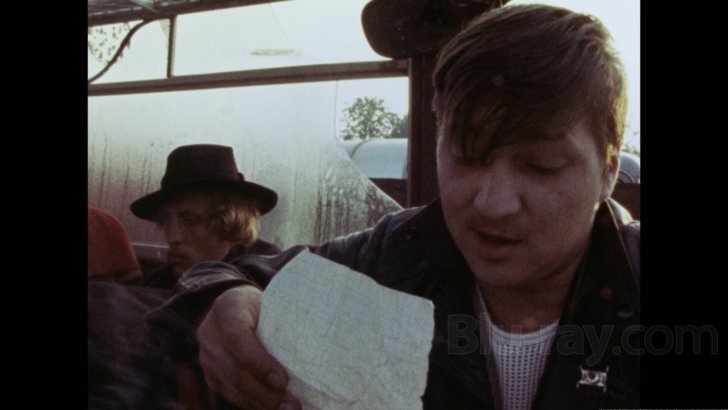
Presented in an aspect ratio of 1.35:1, encoded with MPEG-4 AVC and granted a 1080i transfer, Volker Schlöndorff's Baal arrives on Blu-ray courtesy of Criterion.
The following text appears inside the leaflet provided with this Blu-ray release:
"This 2K digital transfer was created on a Cintel C-Realty film scanner from the 16mm original camera negative and restored in 2014 at Alpha-Omega Digital GmbH in Munich, under the supervision of director Volker Schlöndorff. Thousands of instances of dirt, debris, scratches, splices, and warps were manually removed using MTI Film's DRS, while Digital Vision's Phoenix was used for jitter, flicker, small dirt, grain, and noise management. The original monaural soundtrack was remastered from a 16mm magnetic track.
Transfer supervisor: Thomas Bakels/Alpha-Omega Digital GmbH.
Colorists: Thomas Bakels, Igor Luther/Alpha-Omega Digital GmbH.
Audio remastering: Klaus Doldinger."
My guess is that camera negative is not in immaculate condition because there are few areas where it is pretty easy to see that time has left its mark. Also, there are minor blemishes that have been retained after the restoration. On the other hand, the entire film has a very specific stylistic appearance that promotes different types of density and fluctuations. For example, if you take a look at screencapture #8 you will see that some sort of a foreign substance, likely Vaseline, was applied around the corners of the camera. Elsewhere it appears that some sort of a small filter was applied to alter light/shadow as well. There are also some interesting contrasts that were produced while positioning and moving the camera in particular ways. What is important to underscore here is that the film has a pleasing organic appearance and is free of digital anomalies. Image stability is very good. My score if 4.25/5.00. (Note: This is a Region-A "locked" Blu-ray release. Therefore, you must have a native Region-A or Region-Free player in order to access its content).
Baal Blu-ray Movie, Audio Quality 
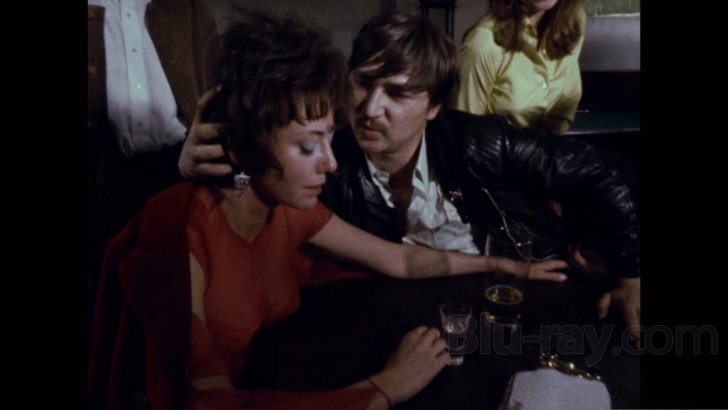
There is only one standard audio track on this Blu-ray release: German LPCM 1.0. Optional English subtitles are provided for the main feature.
The audio stable and clean, but since Baal was a TV project the original sound design is far from impressive. On the other hand, it definitely feels perfectly in sync with the raw documentary appearance that Volker Schlöndorff chose for it. The dialog is stable and easy to follow, and the English translation is very good.
Baal Blu-ray Movie, Special Features and Extras 
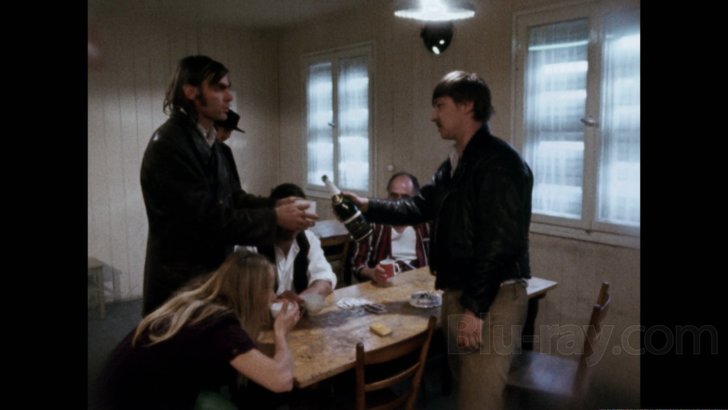
- Ethan Hawke and Jonathan Marc Sherman - in this brand new film conversation, Ethan Hawke and playwright Jonathan Marc Sherman discuss the intricate nature and construction of Bertolt Brecht's play Baal, the main themes in the play and the manner in which they are transferred to Volker Schlöndorff's film, Reiner Werner Fassbinder's performance and the incredible body of work he left behind, etc. The conversation was filmed exclusively for Criterion in New York City in November 2017. In English, not subtitled. (17 min, 1080p).
- Eric Rentschler - in this brand new video interview, Eric Rentschler, a film historian and the Arthur Kingsley Porter Professor of Germanic languages and literature at Harvard University, discusses the environment in which Baal emerged, Bertolt Brecht's original play that inspired the film and its history, Volker Schlöndorff's relationship with Reiner Werner Fassbinder and collaboration on Baal, the rebellious nature of the film, etc. The interview was conducted exclusively for Criterion in Cambridge, Massachusetts, in November 2017. In English, not subtitled. (18 min, 1080i).
- Margarethe von Trotta - in this brand new video interview, actor and director Margarethe von Trotta recalls her initial encounter with Volker Schlöndorff in 1969, and discusses the arrival of Reiner Werner Fassbinder and the immediate impact that he had on Baal, the anti-hero the iconic actor/director was portraying, the unusual camera movement throughout the film, etc. The interview was conducted exclusively for Criterion in Munich in December 2017. In German, with optional English subtitles. (12 min, 1080i).
- Volker Schlöndorff (2015) - in this documentary, director Volker Schlöndorff discusses the production history of Baal, the evolution of the script for the film his interactions with Reiner Werner Fassbinder during the production process, the famous troupe of actors that were contracted, etc. The documentary was produced by Robert Fischer for Fiction Factory in Berlin, on February 12, 2015. In French, with optional English subtitles. (49 min, 1080p).
- Volker Schlöndorff (1973) - on the occasion of Baal's premiere on French television on September 2, 1973, director Volker Schlöndorff recorded this discussion of his instinctual approach to developing the film, as well as its portrayal of art and Brechtian philosophy. In French, with optional English subtitles. (5 min, 1080p).
- Leaflet - an illustrated leaflet featuring critic Dennis Lim's essay "The Nature of the Beast" and technical credits.
Baal Blu-ray Movie, Overall Score and Recommendation 
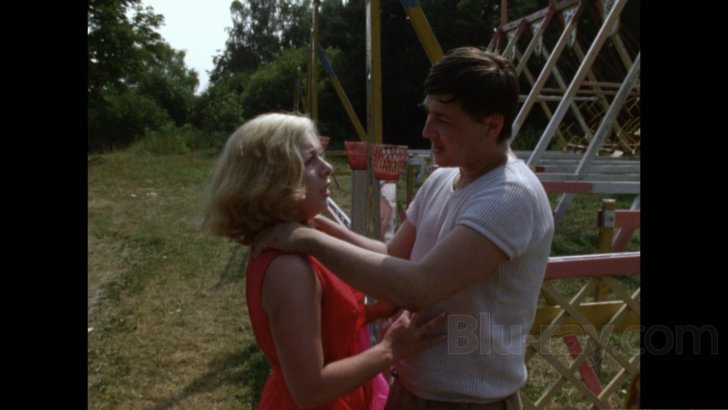
It is very unfortunate that Rainer Werner Fassbinder and Lars von Trier came from different eras because if somehow they had the opportunity to work together they would have been a legendary team, the ultimate wrecking ball that would have destroyed mountains of cinematic cliches and shamed the hypocrites that defended them. In Volker Schlöndorff's Baal Fassbinder becomes one of the most repulsive social outcasts ever captured by a camera, but the film was actually conceived to manipulate you, the viewer, and in the process make you rethink the ways in which you have been conditioned to judge quality. It is not for everyone, but if you give it a chance and stay with Fassbinder's character until the final credits roll you will see that it is remarkably effective. Previously incredibly difficult to see, Baal was recently restored in 2K at Alpha-Omega Digital GmbH in Germany, under the supervision of its director. VERY HIGHLY RECOMMENDED.
Similar titles
Similar titles you might also like

Hidden Pleasures
Los placeres ocultos
1977

Goto, Isle of Love
Goto, l'île d'amour
1969

Murmur of the Heart
Le souffle au coeur
1971

Diary of a Country Priest
Journal d'un curé de campagne
1951

Early Spring
早春
1956

Adoption
Örökbefogadás
1975

Mandabi
1968

Pain and Glory
Dolor y gloria
2019

The Boys from Fengkuei
風櫃來的人 / Feng gui lai de ren / All the Youthful Days
1983

Devi
The Goddess
1960

Documenteur
1981

A Hen in the Wind
風の中の牝鶏
1948

Like Father, Like Son
2013

Peppermint Candy
박하사탕 | 4K Restoration
1999

There Was a Father
父ありき
1942

La Pointe Courte
1955

Elles
2011

El Planeta
2020

How to Be Loved
Slipcover in Original Pressing
1963

A Tale of Sorrow and Sadness
Limited Edition
1977